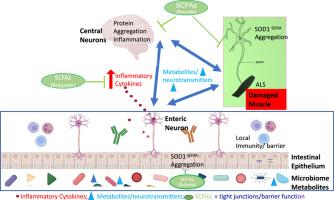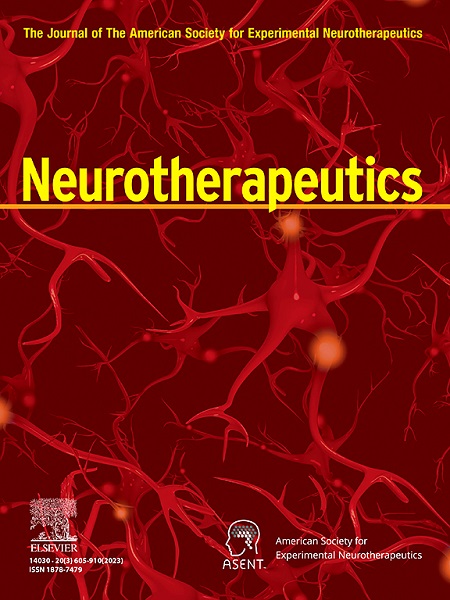ALS 中的微生物组和微量营养素:从新机制到新疗法
IF 5.6
2区 医学
Q1 CLINICAL NEUROLOGY
引用次数: 0
摘要
肌萎缩侧索硬化症是一种神经退行性疾病。尽管进行了大量研究,但 ALS 的治疗仍面临挑战。最近的 ALS 研究表明,菌群失调(如肠道微生物群中微生物多样性和有益功能的丧失)与 ALS 的肠道炎症和肠道完整性的改变相关。微生物组和微生物代谢物通过肠道-微生物组-神经元轴在 ALS 发病机制中的新概念和作用已慢慢被神经病学研究领域所认识。在此,我们将讨论微生物组(包括细菌、真菌和病毒)在 ALS 研究中的最新进展。我们将讨论我们对ALS中微生物代谢物的理解。微营养是指必需维生素、矿物质和其他微量营养素的摄入量。我们将总结与微营养和渐冻症有关的文献。此外,我们还将考虑微生物组和微营养在 ALS 的发展和治疗中的相互影响。我们还将进一步提出,机理研究和转化研究应从 "不相信 "转变为 "有说服力的独创性",从 "实验室研究 "转变为 "床旁应用",从而为 ALS 的诊断和治疗提供新的策略。本文章由计算机程序翻译,如有差异,请以英文原文为准。

Microbiome and micronutrient in ALS: From novel mechanisms to new treatments
Amyotrophic lateral sclerosis is a neurodegenerative disorder. Despite extensive studies, it remains challenging to treat ALS. Recent ALS studies have shown dysbiosis (e.g., loss of microbial diversity and beneficial function in the gut microbiota) is correlated with intestinal inflammation and change of intestinal integrity in ALS. The novel concepts and the roles of microbiome and microbial metabolites through the gut-microbiome-neuron axis in ALS pathogenesis have been slowly recognized by the neurology research field. Here, we will discuss the recent progress of microbiome, including bacteria, fungi, and viruses, in the ALS research. We will discuss our understanding of microbial metabolites in ALS. Micronutrition refers to the intake of essential vitamins, minerals, and other micronutrients. We will summarize the literation related to micronutrition and ALS. Furthermore, we will consider the mutual interactions of microbiome and micronutrition in the ALS progression and treatment. We further propose that the mechanistic and translational studies that shift from suspension of disbelief to cogent ingenuity, and from bench study to bed-side application, should allow new strategies of diagnosis and treatment for ALS.
求助全文
通过发布文献求助,成功后即可免费获取论文全文。
去求助
来源期刊

Neurotherapeutics
医学-神经科学
CiteScore
11.00
自引率
3.50%
发文量
154
审稿时长
6-12 weeks
期刊介绍:
Neurotherapeutics® is the journal of the American Society for Experimental Neurotherapeutics (ASENT). Each issue provides critical reviews of an important topic relating to the treatment of neurological disorders written by international authorities.
The Journal also publishes original research articles in translational neuroscience including descriptions of cutting edge therapies that cross disciplinary lines and represent important contributions to neurotherapeutics for medical practitioners and other researchers in the field.
Neurotherapeutics ® delivers a multidisciplinary perspective on the frontiers of translational neuroscience, provides perspectives on current research and practice, and covers social and ethical as well as scientific issues.
 求助内容:
求助内容: 应助结果提醒方式:
应助结果提醒方式:


